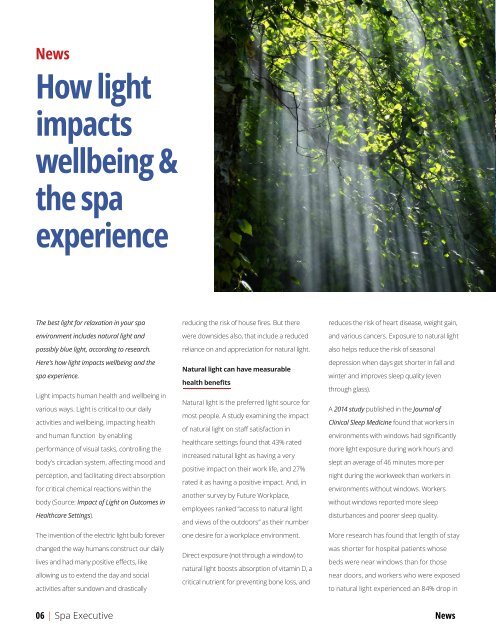SPA EXECUTIVE MAY 2022
The design issue, with Bill Bensley, Alberto Apostoli, and more.
The design issue, with Bill Bensley, Alberto Apostoli, and more.
Create successful ePaper yourself
Turn your PDF publications into a flip-book with our unique Google optimized e-Paper software.
News<br />
How light<br />
impacts<br />
wellbeing &<br />
the spa<br />
experience<br />
The best light for relaxation in your spa<br />
environment includes natural light and<br />
possibly blue light, according to research.<br />
Here’s how light impacts wellbeing and the<br />
spa experience.<br />
Light impacts human health and wellbeing in<br />
various ways. Light is critical to our daily<br />
activities and wellbeing, impacting health<br />
and human function by enabling<br />
performance of visual tasks, controlling the<br />
body’s circadian system, affecting mood and<br />
perception, and facilitating direct absorption<br />
for critical chemical reactions within the<br />
body (Source: Impact of Light on Outcomes in<br />
Healthcare Settings).<br />
The invention of the electric light bulb forever<br />
changed the way humans construct our daily<br />
lives and had many positive effects, like<br />
allowing us to extend the day and social<br />
activities after sundown and drastically<br />
reducing the risk of house fires. But there<br />
were downsides also, that include a reduced<br />
reliance on and appreciation for natural light.<br />
Natural light can have measurable<br />
health benefits<br />
Natural light is the preferred light source for<br />
most people. A study examining the impact<br />
of natural light on staff satisfaction in<br />
healthcare settings found that 43% rated<br />
increased natural light as having a very<br />
positive impact on their work life, and 27%<br />
rated it as having a positive impact. And, in<br />
another survey by Future Workplace,<br />
employees ranked “access to natural light<br />
and views of the outdoors” as their number<br />
one desire for a workplace environment.<br />
Direct exposure (not through a window) to<br />
natural light boosts absorption of vitamin D, a<br />
critical nutrient for preventing bone loss, and<br />
reduces the risk of heart disease, weight gain,<br />
and various cancers. Exposure to natural light<br />
also helps reduce the risk of seasonal<br />
depression when days get shorter in fall and<br />
winter and improves sleep quality (even<br />
through glass).<br />
A 2014 study published in the Journal of<br />
Clinical Sleep Medicine found that workers in<br />
environments with windows had significantly<br />
more light exposure during work hours and<br />
slept an average of 46 minutes more per<br />
night during the workweek than workers in<br />
environments without windows. Workers<br />
without windows reported more sleep<br />
disturbances and poorer sleep quality.<br />
More research has found that length of stay<br />
was shorter for hospital patients whose<br />
beds were near windows than for those<br />
near doors, and workers who were exposed<br />
to natural light experienced an 84% drop in<br />
06 | Spa Executive News


















